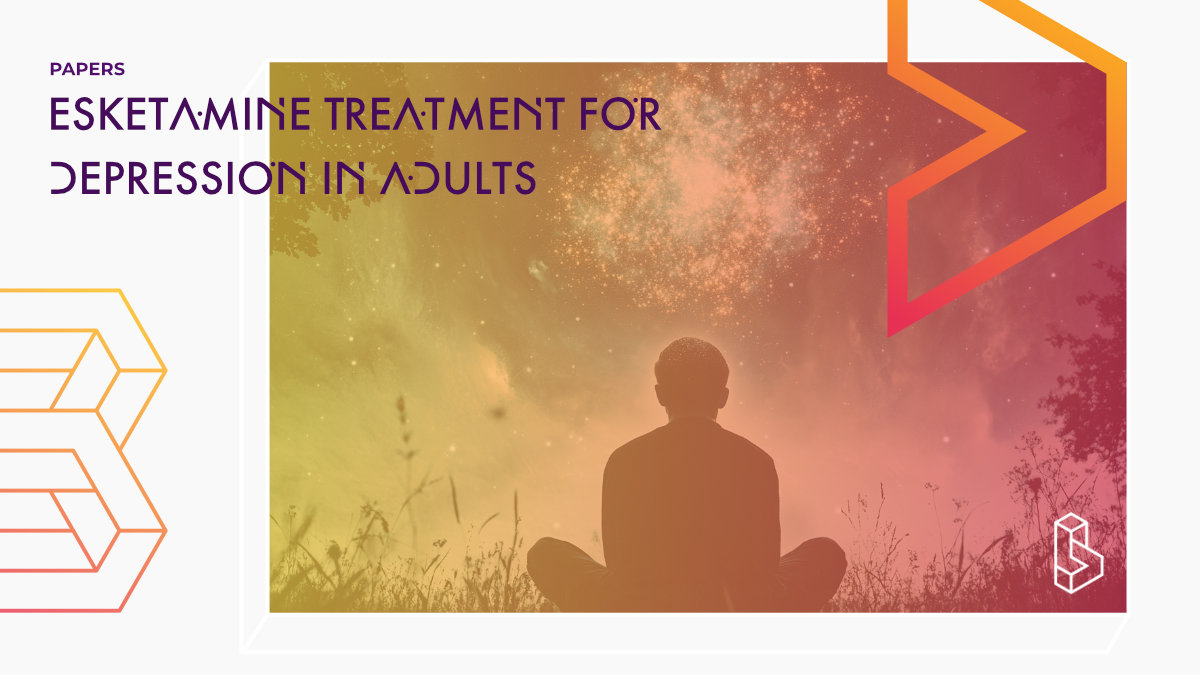This systematic review and meta-analysis (s=87; 2025) finds esketamine’s efficacy as an adjunctive therapy for treatment-resistant depression (TRD) to be modest (effect size 0.15-0.23) and comparable to atypical antipsychotics, with no significant effect on suicidality. The review raises concerns about esketamine’s abuse potential and unknown long-term effects. It also highlights regulatory issues, including deaths and emerging suicidality during clinical trials.
Abstract of Esketamine Treatment for Depression in Adults
“Objective Intranasal esketamine has been approved as an adjunctive therapy for treatment-resistant major depressive disorder with acute suicidal ideation and behavior. The authors conducted a systematic review and meta-analysis of the available data on its efficacy against depression and suicidality as well as its side effects.
Methods MEDLINE was searched with the keyword “esketamine” on March 24, 2024, using the PRISMA method. Data processing and statistical analysis were performed with R, version 4.3.3, and the meta-analysis was performed with the METAFOR package.
Results Of 1,115 articles initially identified, 87 were included for analysis and discussion. At weeks 2–4, randomized controlled trials were mostly negative or failed; however, the meta-analysis returned a weak but significant positive effect for depression (effect size range, 0.15–0.23 at weeks 2–4), similar to augmentation strategies with atypical antipsychotics for treatment-resistant depression. The effect size concerning suicidality was not significant at any time point. The sensitivity analysis produced the same results.
Conclusions The study findings suggest that esketamine’s efficacy as an add-on to antidepressants is modest in treatment-resistant depression (similar to augmentation strategies with atypical antipsychotics) and is absent against suicidality itself. These findings need to be considered in light of esketamine’s abuse potential and the fact that long-term effects are still not fully known. Some alarming signs concerning deaths and emerging suicidality during the testing phase are discussed, along with other regulatory issues.“
Authors: Konstantinos N. Fountoulakis, Athanasios Saitis, & Alan F. Schatzberg
Summary of Esketamine Treatment for Depression in Adults
Please see this critical commentary here (and the response).
Treatment-resistant depression (TRD) poses significant challenges in psychiatric care, as patients often do not respond adequately to standard antidepressant therapies. Esketamine, a derivative of ketamine, has emerged as a potential therapeutic option for TRD. Unlike traditional antidepressants that primarily target monoamine neurotransmitters, esketamine acts as a non-competitive antagonist of the N-methyl-D-aspartate (NMDA) receptor, influencing the glutamate system in the brain. This novel mechanism has garnered attention due to its rapid onset of antidepressant effects.
The U.S. Food and Drug Administration (FDA) has approved esketamine nasal spray, marketed as SPRAVATO®, for adults with major depressive disorder who have not responded to at least two oral antidepressants. This approval was based on clinical trials demonstrating esketamine’s efficacy in reducing depressive symptoms and its potential to induce remission in a subset of patients. However, concerns have been raised regarding the magnitude of its therapeutic effects, safety profile, and the risk of adverse events, including dissociation and potential for misuse.
Given these considerations, Fountoulakis and colleagues aimed to systematically review and analyze existing literature to provide a clearer understanding of esketamine’s role in treating depression, particularly focusing on its efficacy, safety, and the balance between benefits and risks.
Methods
Find this paper
Esketamine Treatment for Depression in Adults: A PRISMA Systematic Review and Meta-Analysis
https://doi.org/10.1176/appi.ajp.20240515
Paywall | Google Scholar | Backup | 🕊
Cite this paper (APA)
Fountoulakis, K. N., Saitis, A., & Schatzberg, A. F. (2025). Esketamine Treatment for Depression in Adults: A PRISMA Systematic Review and Meta-Analysis. American Journal of Psychiatry, appi-ajp.
Study details
Compounds studied
Ketamine
Topics studied
Treatment-Resistant Depression
Depression
Study characteristics
Meta-Analysis
Literature Review

